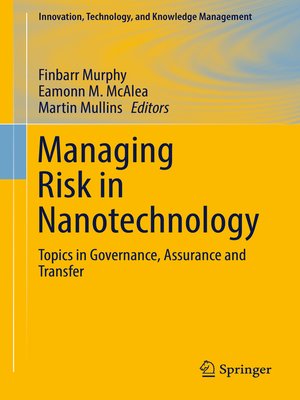Managing Risk in Nanotechnology
ebook ∣ Topics in Governance, Assurance and Transfer · Innovation, Technology, and Knowledge Management
By Finbarr Murphy

Sign up to save your library
With an OverDrive account, you can save your favorite libraries for at-a-glance information about availability. Find out more about OverDrive accounts.
Find this title in Libby, the library reading app by OverDrive.



Search for a digital library with this title
Title found at these libraries:
| Library Name | Distance |
|---|---|
| Loading... |
This book aims to address how nanotechnology risks are being addressed by scientists, particularly in the areas of human health and the environment and how these risks can be measured in financial terms for insurers and regulators. It provides a comprehensive overview of nanotechnology risk measurement and risk transfer methods, including a chapter outlining how Bayesian methods can be used. It also examines nanotechnology from a legal perspective, both current and potential future outcomes.
The global market for nanotechnology products was valued at $22.9 billion in 2013 and increased to about $26 billion in 2014. This market is expected to reach about $64.2 billion by 2019, a compound annual growth rate (CAGR) of 19.8% from 2014 to 2019. Despite the increasing value of nanotechnologies and their widespread use, there is a significant gap between the enthusiasm of scientists and nanotechnology entrepreneurs working in the nanotechnology space and theinsurance/regulatory sector. Scientists are scarcely aware that insurers/regulators have concerns about the potential for human and environmental risk and insurers/regulators are not in a position to access the potential risk. This book aims to bridge this gap by defining the current challenges in nanotechnology across disciplines and providing a number of risk management and assessment methodologies.
Featuring contributions from authors in areas such as regulation, law, ethics, management, insurance and manufacturing, this volume provides an interdisciplinary perspective that is of value to students, academics, researchers, policy makers, practitioners and society in general.







